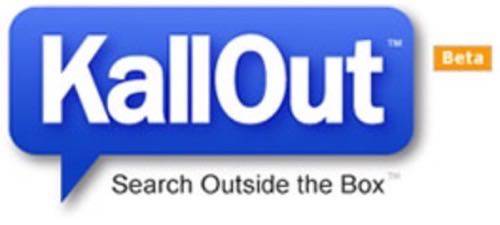Editor’s Note: This list was contributed by Charles Knight, editor of AltSearchEngines, a former RWW network blog.

In terms of user experience, the gap between the major search engines and their alternatives continues to widen — a lot. Google has been compared to a luxury liner that turns around very, very slowly, whereas the startups are speedboats that can turn (or innovate) on a dime. I guarantee that if you try any of these top 10 alternative search engines of 2008, you won’t come away saying, “Hey, that was just like Google.”
2008 was the year when the ubiquitous white home page with the rectangular search box in the center finally “jumped the shark.” This template belongs in the past, not the future, of search. That is not to say that users no longer have to communicate what they’re searching for in some way, but the trend is certainly towards variety and away from “The Box.” For example, with ChaCha (and Tazti.com), you simply speak your query; and Surf Canyon understands implicitly what you are looking for.
As evidence of just how much the landscape is changing, three of our top 10 products require one-time downloads: once thought to be the kiss of death when Google sits in wait. But AltSearchEngines thinks that 2009 will be the tipping point when the rewards outweigh the “risks,” at least for power users. For everyone else: 2010. Faroo, KallOut, and Surf Canyon (and, again, Tazti) are all well worth leaving your comfort zone for.
How many of these 10 search tools had you used, seen, or even heard of before today? The latest data from Hitwise shows that the four major search engines get over 98% of all US search traffic; the rest, combined, get less than 2%. These wonderful inventions need and deserve more exposure, so do your part and take the time to try out each one! On that note, let’s begin.
This is the ninth in ReadWriteWeb’s series of top products of 2008:
- Top 10 Semantic Web Products of 2008
- Top 10 International Products of 2008
- Top 10 Consumer Web Apps of 2008
- Top 10 RSS and Syndication Products of 2008
- Top 10 Mobile Web Products of 2008
- Top 10 Enterprise Web Products of 2008
- Top 10 Real World Web Apps of 2008
- Top 10 Digital Lifestyle Products of 2008
Note: these 10 search engines are listed alphabetically.
1. ChaCha
ChaCha, as a search tool, is human-powered, general, and mobile. There is no website, no search box, and no page witih a list of ten links. To use ChaCha, simply call 1-800-2ChaCha (1-800-224-2242) in the US, or send a text to 242242. When you call, leave your query just as you would any other voice-mail message, and hang up. Within 2 to 5 minutes, a human guide will have researched and texted you the answer. I used ChaCha with only my cheap cell phone when I was lost in New York City at midnight. And that’s an important point: you can call ChaCha at any time with any question for any reason on any phone — as long as that phone can receive text messages. And, aside from your carrier’s incoming text fees, ChaCha is free. We recently reported on ChaCha over at AltSearchEngines.

2. Cooliris
2008 was the year when search visualization met the iPhone. Cooliris has already won one ReadWriteWeb award, making it onto the list of the Top 10 Consumer Apps of 2008. RWW wrote in that post, “Visual browsing is still coming into its own, but Cooliris is leading the charge in a way that consumers will embrace.” We at ASE have been following Cooliris since its PicLens days. Following right behind are SearchMe and Viewzi. Each of these three visual search engines displays your search results beautifully and fluidly on your iPhone, but with different styles, so you might as well download all three and experiment. There is a demo video on each site.

3. Faroo
Alternative search engines need at least one thing that differentiates them from the major search engines. Faroo, for its part, turns your conception of search around 180 degrees. Instead of one giant company (say, Google) storing billions of web pages on thousands of servers at a cost of millions of dollars, Faroo, now in public beta, relies on the P2P (peer-to-peer) network, which connects Faroo members with each other through their PCs. The result is an organic-looking web that can grow as the Internet grows, but without the need for massive server farms. So, check out Faroo by downloading it here.

4. KallOut
KallOut was one of our favorite discoveries this year, as we noted in the ASE review. Once again, it’s time to put away that image of a rectangular search box! It’s 2008! With KallOut, you don’t have to stop what you’re doing and mess around with a toolbar, tab, or window. You simply drag your cursor over content with your mouse, and KallOut performs the search for you right there — literally, right there. Download KallOut here, and then practice a bit until you get the hang of it. No, it’s not a harder way to search; it’s a more efficient way to search. You’ll see.

5. Kosmix
Kosmix is, in a way, an evolution of the old meta search engines. Kosmix answers your query with a long tabloid-like page of results in every possible category you might want. There are multiple news sources; images from various sites; audio from SeeqPod; opinions from Omgili; video from Truveo; info from Mahalo and Snappyfingers; plus content from all of the major sources, such as eBay, YouTube, and Wikipedia. Just about everything! For every search query, you essentially get an on-the-fly multimedia encyclopedia laid out on one page. Kosmix recently came into a little money, too. (Disclosure: Kosmix is an AltSearchEngine sponsor.)

6. Mednar
We had no idea how many health search engines there really were until Hope Leman started covering them on AltSearchEngines. Mednar is one we’re particularly fond of: “I am in jaw-dropping, stupefied awe at the general excellence of the products of his (CEO Abe Lederman’s) firm. Anything that saves all of us time as we hunt for relevant data amidst overwhelming amounts of information on every conceivable aspect of disease day after day catches my attention, and it has been caught today by Mednar.”

7. Quintura
When you search with Quintura, you’ll see a two-dimensional tag cloud (i.e. not a list). The other words in the box are there to allow you to explore concepts related to your original query. See something you hadn’t thought of? Click on it and the cloud re-orients itself around that new term. You can delete irrelevant terms as well. But don’t worry, it also provides a traditional list for you, just in case. Quintura is now available in several language “flavors” as well! Content publishers should investigate Quintura for possible use on their sites. (Disclosure: Quintura is a sponsor of both AltSearchEngines and RWW.)

8. SeeqPod
Speaking with SeeqPod‘s CEO Kasian Franks, I was shocked, shocked, to learn that not everyone owns an iPhone! Apparently there are millions of people who have nice smart phones that run something called “Windows Mobile.” Anyway, SeeqPod has been constantly improving its music search engine ever since we came across it. And now, it can be installed on millions of smart phones that use the Windows Mobile platform (v.6.0 or higher). This, as RWW noted the other day, “is a bold move from one of the most innovative companies in online music. The SeeqPod API is already one of the most popular for third parties to integrate streaming music into other apps, and the company seems to launch something unexpected every month. This has got to take the cake, though.”


9. Surf Canyon
Can I say it again? Search, after ten years, is no longer that ubiquitous box in the middle of the web page. In 2008, it gave way to innovative search tools that integrate useful features in new ways. Surf Canyon is also a download. I wonder how many commenters will say that no one will download an app? (Sigh.) The reason it’s worth the download is that it turbo charges your regular searches. Surf Canyon actually watches what you do — and don’t do — and what you click on, and it instantly pulls search results from deeper pages (say, page 8) and brings them forward if it determines that they can save you time — a lot of time. And if you’re still hesitant about the download, watch the video.

10. Taggalaxy.de
What’s this? A personal favorite? This write-up is just a sneak peek of Taggalaxy.de; the rest is up to you. Taggalaxy.de (in German) was created by a German graduate student for a class project. There are almost no instructions: I had to learn how to use it by clicking, double-clicking, dragging, and just playing around with it. But I can tell you this, once you’ve got the hang of it, find a dark room with a monster screen, and then perform a search. What you see will be not just an alternative search engine, but an alternative search galaxy!


So, there it is. In 2006, I began a mission to find every search engine, one by one. The resulting list of 100 Alternative Search Engines was published on ReadWriteWeb in January of 2007. Four months later, AltSearchEngines was launched by myself and Richard MacManus, with an index of 1,000 alternatives to the major engines. Since then, AltSearchEngines has published over 2,000 posts about, “the most wonderful search engines you’ve never seen.” Having honed our search-engine-finding skills, I can tell you that this list of the top 10 alternative search engines for 2008 is as current as today’s news. Want more? AltSearchEngines reports on important updates, features guest posts from search experts, and of course explores the as-yet-unseen search engines of 2009, every day. Come and join us!

















